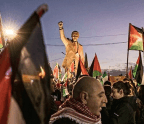HOW VENEZUELA STRUCK IT POOR

IN THE SPRING OF 1959, at a secretive meeting at a yacht club in Cairo, Venezuela’s then-minister of mines and hydrocarbons, Juan Pablo Pérez Alfonso, hatched a plan to give big oil-producing countries more control over their black gold—and a greater share of the wealth it promised to create. A year later, his scheme would be formally christened the Organization of the Petroleum Exporting Countries, or OPEC. Venezuela, which sits atop what are arguably the biggest petroleum reserves in the world, was the only non-Middle Eastern country to be included—a testament to its importance to the global oil business.
Venezuela was considered rich in the early 1960s: It produced more than 10 percent of the world’s crude and had a per capita GDP many times bigger than that of its neighbors Brazil and Colombia—and not far behind that of the United States. At the time, Venezuela was eager to diversify beyond just oil and avoid the so-called resource curse, a common phenomenon in which easy money from commodities such as oil and gold leads governments to neglect other productive parts of their economies. But by the 1970s, Venezuela was riding a spike in oil prices to what looked like a never-ending economic bonanza. Complemented by years of stable democracy, it seemed a model country in an otherwise often troubled region.
Such success makes the sorry state of Venezuela’s oil industry today, not to mention that of the country at large, all the more surprising—and tragic. The same state that, six decades ago, dreamed up the idea of a cartel of oil exporters now must import petroleum to meet its needs. Crude production has tanked, hitting a 28-year low last fall when it dipped under 2 million barrels a day. “I don’t think we’ve ever seen a collapse of that magnitude [anywhere] without a war, without sanctions,” said Francisco Monaldi, a Latin America expert at Rice University’s Baker Institute for Public Policy.
Venezuela has not, of course, fought a war in recent years. But the combination of plummeting oil revenues and years of government mismanagement has virtually killed off the country’s economy, sparking a humanitarian crisis that threatens to engulf the region. Caracas refuses to track inflation (or at least publish its findings), but the National Assembly calculates the annual
You’re reading a preview, subscribe to read more.
Start your free 30 days



